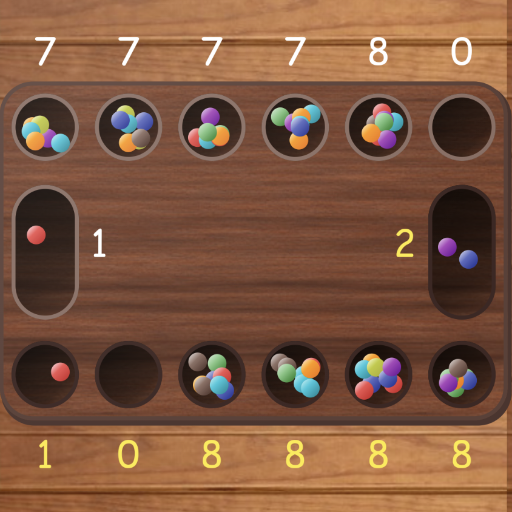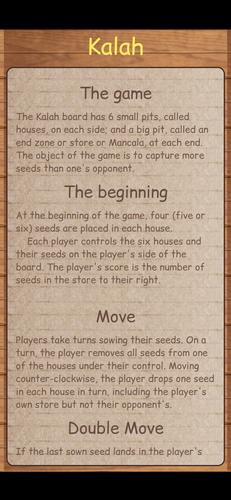Mancala games
The mancala family of board games offers a rich variety of two-player strategy games that have been enjoyed across the world for centuries. Played with small stones, beans, or seeds and a board featuring rows of holes or pits, the primary objective in these games is to capture as many of your opponent's pieces as possible. Notable variations within the mancala family include oware, bao, and omweso, each with its unique rules and strategies.
This particular implementation focuses on three popular mancala games: kalah, oware, and congkak. The game setup includes a board with six small pits, known as houses, on each side, and a larger pit, called an end zone or store, at each end. Players aim to capture more seeds than their opponent by skillfully maneuvering their seeds across the board.
Kalah Rules:
- Setup: At the start, four (or sometimes five to six) seeds are placed in each house.
- Control: Each player manages the six houses and their seeds on their side of the board. The score is determined by the number of seeds in the store to the player's right.
- Sowing: Players take turns selecting one of their houses and distributing its seeds counter-clockwise, including their own store but excluding the opponent's.
- Capturing: If the last seed lands in an empty house owned by the player, and the opposite house contains seeds, the player captures both the last seed and the seeds from the opposite house, placing them in their store.
- Additional Moves: Landing the last seed in the player's store grants an extra turn.
- Endgame: The game ends when one player has no seeds left in their houses. The remaining seeds are moved to the other player's store, and the player with the most seeds in their store wins.
Oware Rules:
- Setup: Similar to kalah, with four (or five to six) seeds in each house.
- Sowing: Players pick a house and distribute its seeds counter-clockwise, skipping the house from which the seeds were taken and the scoring houses.
- Capturing: Captures occur when the final seed sown brings an opponent's house to exactly two or three seeds. All captured seeds are moved to the player's scoring house. If the previous-to-last seed also brings an opponent's house to two or three, those seeds are captured as well, and this process continues backward until a house is reached that does not contain two or three seeds or belongs to the player.
- Starvation Rule: If an opponent has no seeds, the current player must make a move that gives the opponent seeds. If no such move is possible, the current player captures all seeds in their territory, ending the game.
- Endgame: The game ends when one player captures more than half the seeds, or when both players have captured half the seeds, resulting in a draw.
What's New in the Latest Version 1.4.1
Last updated on Aug 6, 2024, this version includes essential bug fixes to enhance your gaming experience.
Mancala games
The mancala family of board games offers a rich variety of two-player strategy games that have been enjoyed across the world for centuries. Played with small stones, beans, or seeds and a board featuring rows of holes or pits, the primary objective in these games is to capture as many of your opponent's pieces as possible. Notable variations within the mancala family include oware, bao, and omweso, each with its unique rules and strategies.
This particular implementation focuses on three popular mancala games: kalah, oware, and congkak. The game setup includes a board with six small pits, known as houses, on each side, and a larger pit, called an end zone or store, at each end. Players aim to capture more seeds than their opponent by skillfully maneuvering their seeds across the board.
Kalah Rules:
- Setup: At the start, four (or sometimes five to six) seeds are placed in each house.
- Control: Each player manages the six houses and their seeds on their side of the board. The score is determined by the number of seeds in the store to the player's right.
- Sowing: Players take turns selecting one of their houses and distributing its seeds counter-clockwise, including their own store but excluding the opponent's.
- Capturing: If the last seed lands in an empty house owned by the player, and the opposite house contains seeds, the player captures both the last seed and the seeds from the opposite house, placing them in their store.
- Additional Moves: Landing the last seed in the player's store grants an extra turn.
- Endgame: The game ends when one player has no seeds left in their houses. The remaining seeds are moved to the other player's store, and the player with the most seeds in their store wins.
Oware Rules:
- Setup: Similar to kalah, with four (or five to six) seeds in each house.
- Sowing: Players pick a house and distribute its seeds counter-clockwise, skipping the house from which the seeds were taken and the scoring houses.
- Capturing: Captures occur when the final seed sown brings an opponent's house to exactly two or three seeds. All captured seeds are moved to the player's scoring house. If the previous-to-last seed also brings an opponent's house to two or three, those seeds are captured as well, and this process continues backward until a house is reached that does not contain two or three seeds or belongs to the player.
- Starvation Rule: If an opponent has no seeds, the current player must make a move that gives the opponent seeds. If no such move is possible, the current player captures all seeds in their territory, ending the game.
- Endgame: The game ends when one player captures more than half the seeds, or when both players have captured half the seeds, resulting in a draw.
What's New in the Latest Version 1.4.1
Last updated on Aug 6, 2024, this version includes essential bug fixes to enhance your gaming experience.





